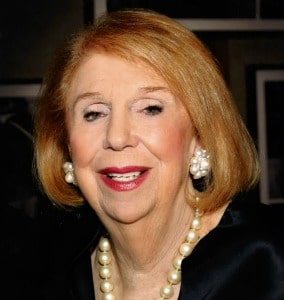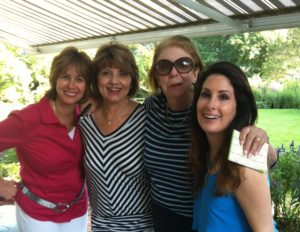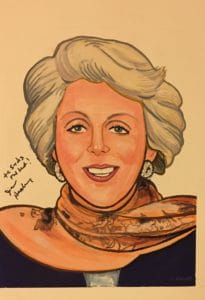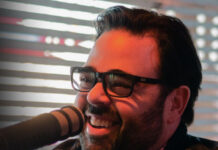
According to Webster’s, a legend is “a famous or important person who is known for doing something extremely well.”
Well, believe me, Joan Hamburg does a lot of things extremely well. Wife, mother (she has a National Mother of the Year award for that), broadcaster (many plaques line her walls), friend, advocate, and humanitarian (the National Council of Churches and the Anti Defamation League, among others, have bestowed honors on her over the years): Joan Hamburg has succeeded at many roles throughout her storied career.
Joan Hamburg, however, is not just a skilled multi-tasker. Ask anyone to describe her and you will always hear of her kindness and compassion, her natural talent and innate ability to connect with all kinds of people, and her insatiable curiosity. If there were a list of synonyms for Google, one of them would surely be “Joan.”
The author of many books, including the New York on $5 a Day series, she began her radio career in the early 1970s and did small consumer segments on WOR’s Rambling With Gambling morning show in New York. Never was there a question too challenging for Joan to research and answer, from finding a great Easter brunch for kids visiting New York to the best place to watch the Thanksgiving Day Parade or where to shop for a wedding gown in Gotham City. The “First Lady of New York Radio” has established a reputation for being an up-close-and-personal bank of wisdom and knowledge to her legions of listeners. Talk about great customer service!
Truly, Joan Hamburg’s remarkable life and career are the stuff of which legends are made. But it is her tenacity, drive, determination, and above all, her humanity, that define those legend-making characteristics we might all strive to emulate.
– Open by Radio Ink Publisher Deborah Parenti
RI: Why did you get into radio back in the 1970s?
Hamburg: It was purely by accident. I was writing stories and copy for New York magazine at the time, and my editor said, “You know, there’s a local radio station that’s having a hard time with its 10-to-midday guy, and they’re looking for another personality.” The guy was Clay Felker, who was a famous editor of magazines, and he said, “I really want you to audition for this thing.” I said, “What do I know about this?”
To make a long story short, I auditioned at Sunday night at 9 o’clock – I did that and sort of forgot about it. A couple of weeks later, I get a phone call: “Congratulations. You are the new 10-12 host on WMCA.” Which now is a paid religious station, but then was a Talk station and the home of The Good Guys.
The job they offered me was the slot where Bob Grant was. Grant had a big mouth and insulted a lot of people. They said they couldn’t deal with it and they were looking for something else. That’s how I got the job. I said, “Why me?” They said, “We were inundated with letters from your 9 o’clock, one-hour, Sunday night audition.” It turned out that all my relatives, and I have a large family, decided, without telling me, to write in and say, “Whatever you had at 9 o’clock on Sunday night was the best thing we’ve heard on radio.”
They sent me to a woman to learn how to do radio, which was very unusual. She was so fantastic – she gave me the best advice in the world. She said, “The whole thing is, never go into any studio unprepared. Always go in with four or five things to talk about, no matter what.” My first program director at WMCA in those days said to me, “To make it in this business, you have to learn two things. You either have to make them hate you or make them love you. If you’re just white bread, you’re going to have a very short career.” I look back over 40 years now and think, “How did all this happen?” It wasn’t like I grew up saying, “I’m going to be a radio personality.” I was writing books. I was an actress. The next thing you know, I’m on the radio. And I’ve never looked back.
RI: What was it like to be a female, one of the only women, on a station that was actually called The Good Guys?
Hamburg: Well, it was interesting. Long John Neville was on the station at that time, and his partner, Candy, she was a woman on the air. But it was basically me. I will give you a quote; I am not going to let you know who said it, but it was interesting. When they called me in and said, “You’ve got the job,” I asked, “What should I talk about for two hours a day?” And this man said to me, “Think tuna fish,” meaning stick to things women are comfortable with, like food, and sandwiches.
And in the early days, whenever there would be a breaking news story or a disaster or a political thing, they would call me up on my headset and say, “Wait, we’re going to send the news director in.” I would say, “I can do that story.” And they would say, “No, the news director.” Of course, life has changed, as we all know, over the years. Everyone was nice and cordial and welcoming, but there were certain expectations.
RI: What was it like working with John Gambling? 
Hamburg: John Gambling was at WOR Radio. I started at WMCA, then a Talk station, and a popular Talk station. I was told that WOR was looking for a person who wanted to do stories, write them and do them on the air, and probably do some of them on The John Gambling Show. Well, John – it was “Daddy” in those days, and Daddy was a legend. My mom used to listen to two people: Barry Gray and the Gambling family. So I said OK, and I went and I auditioned, and I got that job. So my job was doing stories, every hour, at drivetime, which was the crack of dawn, and afternoon drive, which was then Herb Oscar Anderson. I worked with John A. Gambling and then his son, John R. Together, we saw the world, because they really had us out there. Listeners came with us all over, whether it was Disneyland or other trips. I fell in love with radio.
RI: How did you start to get a reputation for knowing where everything is and reviewing everything in New York City?
Hamburg: Well, I had written a book called New York on $5 a Day. That’s when I really fell in love with information, the way women fall in love with shoes. I was obsessed with information. I would walk all over the city doing stories. I started doing all these stories for the Gamblings and for the afternoon drive slot. They became enormously popular – where to go, what to do, where to eat, how to get the best buys on everything, consumer alerts. They really were a big deal.
I started out doing one in the morning, then I was doing them every hour, mornings and afternoons. By now I was at WOR, and they called me in one day and said, “How would you like to do a show as well?” I said, “Features too?” They said, “Yes. We’re not going to give up the features.” The features first, then it started with an hour, and then it went to two hours, and then it went to six days a week from five days. I really was on the air a lot.
RI: Why do you love doing that on the radio? Obviously you have a passion for it.
Hamburg: Radio is one of the most intimate forms of communication anywhere. All those years, I did TV, too, on the news – CBS, NBC, even local Fox. And people would stop you in the street from the television and say, “Oh, I love you,” even if you hadn’t been on the station for two years.
Radio was a direct connection. You became whatever was missing in someone’s life or whatever anyone needed. You were the girlfriend, the wife, the best friend, the sister, the mother. I often tell this story about a day I was in a cab taking one of my children on a play date. I was doing the usual mother thing – “Make sure you shake hands and do this and do that” – I was a really nudge mom. As we pull up, the driver, a very attractive young guy with an accent, turned around and said, “Uhhh,” and he used a profanity that began with an “s.” He said, “You’re just a mother.” I looked at him like, “What?” He said, “I came to this country and I found you on the radio. You were my fantasy. You were my girlfriend. You were my key to the city. And here you are, not that there’s anything wrong with it, but you’re just a mom.”
I thought, that’s the magic of radio. And you really can make a difference in people’s lives. I never did yelling, screaming radio. I always did information or the kind of things that, because you are in the broadcast business, you had access to and most other people didn’t. And I’m a sharer. It just worked out.
 RI: The “White Pages of Radio,” or “Google before there was Google” – that all fits who you are?
RI: The “White Pages of Radio,” or “Google before there was Google” – that all fits who you are?
Hamburg: I would say yes. We’re still doing it. Yes, we do a couple of hours, but we still do stories that are enormously popular on drivetime at 5:45 Thursdays and Fridays. We get a huge response, whether we’re telling them where they can get cheap tickets to the theater or how they can bring their family to Radio City, and I give them secret codes. No matter what kind of information we give them – like how to get into a medical trial that they didn’t know about – they want it.
RI: And you find all that stuff yourself?
Hamburg: We work really hard. I still clip, cut, read everything you’ve ever heard of. It’s awful – I have a sea of papers coming out of my bag because to me, everywhere you go, there’s a story. You go to any corner in New York City, there’s a story. It’s sort of like the White Queen in Alice in Wonderland: six impossible things before breakfast. It’s all out there. And I just love to find that story that’s going to give someone else something they didn’t have before.
RI: Tell us about one of the craziest listener trips in your years doing that.
Hamburg: We did trips at least once or twice a year, everything from Asia to China. We’ve had nutty ones. We’ve taken listeners on elephants into the jungle outside a community in Thailand. One of our listeners didn’t want to get on the elephant. The poor guy was handicapped; it was his nightmare. He finally gets up on the elephant with his wife shrieking at him and he starts screaming, “Even my proctologist is better than this!”
People, though, were great sports. Korea, in January or February when it was I can’t even tell you how cold, one of our listeners turned around and said – her hands were just freezing – she asks, “Am I having a good time?” I said, “You’re having the best time.” Suddenly she was smiling and all happy. We did Vietnam. We did little villages in Italy, all over Europe, Spain. We did broadcasts where they swore everyone spoke English, an hour or two out of Madrid, and no one spoke English – my guests consisted of a drunken bullfighter, a communist mayor who spoke not a word of English, and everyone sort of lying on the floor with their cups filled with booze. And that was being broadcast back to America. It was a wild experience.
RI: Why did you do those trips?
Hamburg: Well, I think truthfully, those were probably sales-generated. You know the advertising department sold these trips to major cruise lines and to travel agencies, and they needed someone to get the listeners to go. One year John R. Gambling and I took over 350 people to China. We started in Turkey. I had my kids with me and we were in Cappadocia, which is this incredible cave community. I warned all the listeners, “Please do not eat anything that isn’t cooked. Do not eat anything raw.” But then morning comes, and it’s a breakfast buffet. And I said to my children, “There’s going to be trouble.” A lot of free food. No one is going to pay attention. The buffet was literally like a locust swarm. And within two hours, I can’t even tell you how sick hundreds of people were from eating that. My son, who turned out to be a comedy writer and a screenwriter, says he knows what the new communion wafer is, because every morning the listeners would line up with their little tongues out, and it was Imodium. And we were the only ones who came prepared with it. But God bless the wonderful listeners. Great sports. And we’ve seen the world together.
RI: What can you tell us about your recent Cuba trip?
Hamburg: It’s an amazing time to be there, because no matter what, it’s still poor. The economy is in shambles in many ways. But the cultural scene, the music, the art, the dance – it’s spectacular. But I am not sure how many listeners one can comfortably take on that kind of trip.
RI: Things have certainly changed in the business since you first started out and were told to talk about tuna fish. Tell us about the good, the bad, and the ugly of radio.
Hamburg: The good: It is still the ultimate form of communication because you can reach out and touch someone. It’s beyond how you look. It’s beyond what they see. It’s how they hear and how they relate. You still have audiences hungry for information and hungry to be a part of something.
The bad is that — now I think that, as long as people crave information and a support system, radio is there, particularly local radio. Local radio is a gift. When you look at the few stations that still do that kind of local, they’re the ones doing great, and they have tremendous audience support. We do remote broadcasts, like many stations. One time on social media, with a quick mention, promoting an event, within two days we were totally sold out with a waiting list of over 100 people. We had to stop it because there was no way we could handle more.
It’s not that it’s ugly, but sometimes it appeals to the lowest common denominator in a race to gain numbers and listeners. There’s room for it – there’s room for everything. It just isn’t what I do. My job, I feel, is to be there to make a difference in people’s lives. I know itsounds Pollyanna-ish, but it really isn’t. We are lucky enough to have the power of the microphone. I feel if you use it in a positive, effective way, that you still can share the very best that is the heart and soul of our industry.
RI: You have certainly evolved over the years.
Hamburg: I used to say, whenever I gave speeches, “How do you survive? You survive by learning to write ‘New’ on the box and hope you’re not running out of space.” That’s part of it. If you ever said to me, five or 10 years ago, “You’re going to be on Facebook all the time. You’re going to be on Twitter. You’re going to be podcasting. You’re going to be doing all this every day,” I would say, “Are you crazy?” And yet, there I am, to my children’s delight, doing all this. And we have to learn that this is the future, and we have to accommodate.
We have a really large podcast audience because it’s like anything else: It’s television-radio by appointment. Once you understand that and can adapt to that, then you’re OK. I am really one of the believers, even though there are naysayers in our industry, that radio isn’t going anywhere. It’s changing its direction. It’s changing its face. But if you’re real, and you’re honorable, and you still have what they want, then you’ve got a real radio audience and you can still sell product like nowhere else, because our audience believes in us. They trust us. They know we really care about them. So if we say to them, “XYZ really works,” they’re going to go out and they’re going to buy it. At a time when it’s very tough to get your share of advertising dollars, we’re still doing it.






I just don’t understand why WABC won’t divest itself from repeating those GOD-AWFUL INFOMERCIALS on Saturday morning, and put JOAN HAMBURG on in a late morning slot for TWO HOURS!
WHO out there agrees with me!
Stuart Lee
She was and is the best relationship seller to both audience and advertiser that I have seen in my career. Great interview and perspective.
Great interview. Jioan is a great person and a great broadcaster. Congrats to Women In Media for giving her this award. i was at the lunch it was beautifully done.